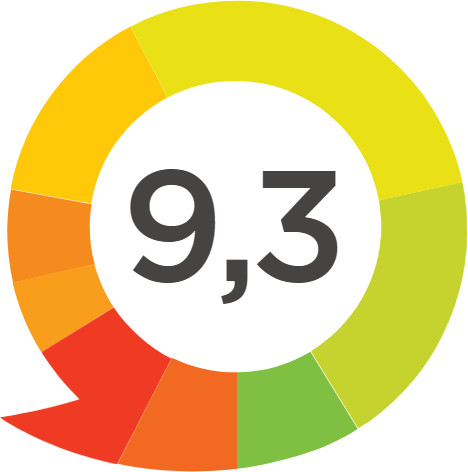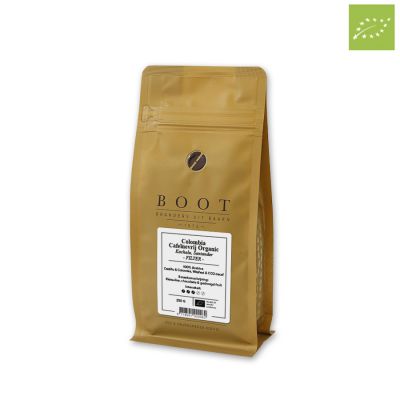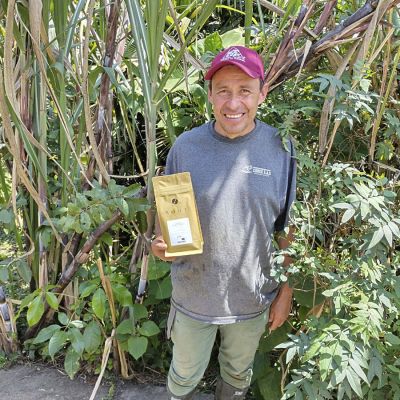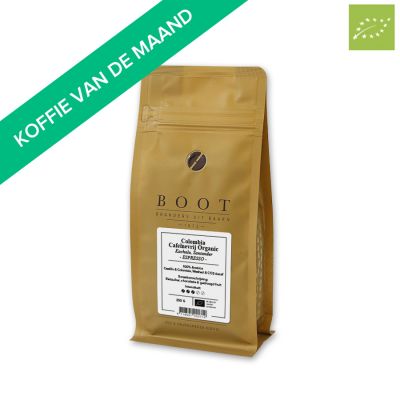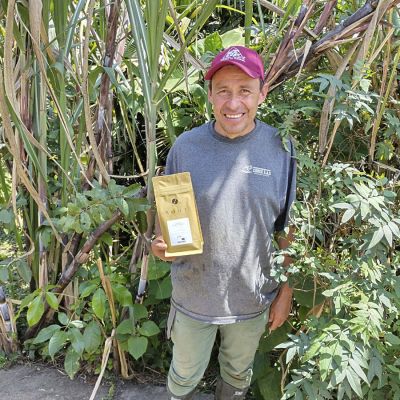- Free shipping in NL from €45
- Order before 12 PM, shipped same business day
- International shipping

Decaf coffee: the taste of good coffee but without caffeine
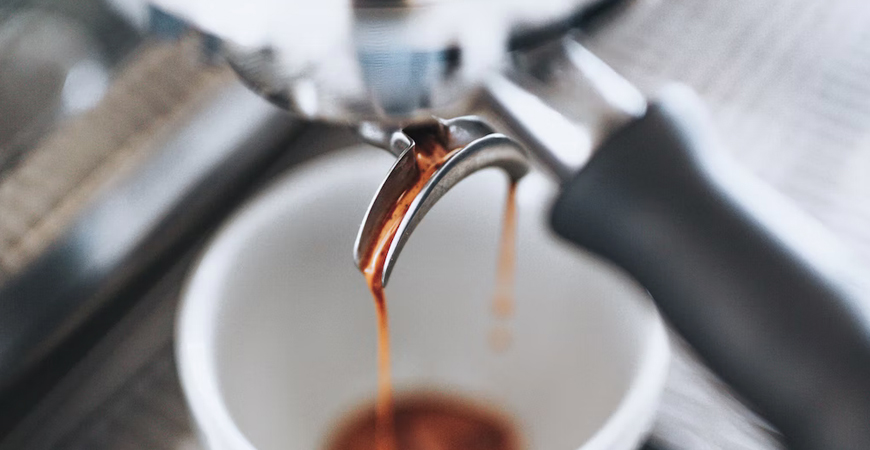
Decaf coffee: the taste of coffee but without caffeine
Coffee contains caffeine. This is a substance found in various plants, but also in coffee beans, for example. The substance makes you feel less tired. In small amounts, about one to two cups of coffee a day, it is even good for concentration. Taking too much coffee can also have drawbacks. For example, you may become restless or get a headache. Now, do you want to avoid that but still enjoy a nice cup of coffee? Then there is decaffeinated coffee, also called decaf.
How much caffeine is in coffee?
The amount of caffeine in a cup of coffee depends on many factors. These include the coffee bean and also the amount of coffee. The arabica bean contains less caffeine than the robusta bean. On average, there are 75 to 100 milligrams of caffeine in a cup of coffee. By comparison, the amount of caffeine in cola is 24 milligrams per 250 ml. And the caffeine in tea is about one-third the caffeine of coffee.
A healthy adult, without experiencing symptoms, can consume about 400 milligrams of caffeine per day. This amounts to about four to five cups of coffee. How long coffee works is largely personal. It can take six hours for caffeine to completely leave your body, while you experience the peak between 30 and 60 minutes after drinking.
Is decaffeinated really caffeinated?
Does decaffeinated mean there really is no caffeine in coffee at all? No, it doesn't. In fact, with decaffeinated coffee beans, at least 97% of the caffeine has been removed. It is not possible to remove all caffeine. How much caffeine remains in decaf coffee varies by type of coffee. Usually it is about 3 milligrams of caffeine per cup. To put it in perspective, 3 milligrams of caffeine is even less than in green and black tea.
But how is decaf coffee made? Decaf coffee involves rinsing the caffeine out of the coffee with water. The most common method used for this is the critical carbonation method. This is an environmentally friendly method of decaffeination in which the beans are immersed in water. This causes the coffee beans to swell and repel the caffeine. The caffeine is then dissolved with carbon dioxide (CO2) under high pressure. Then the coffee beans are dried and the CO2 evaporates again. At Boot Koffie, we also use this environmentally friendly method and you can read more about it in our blog on'How is coffee decaffeinated?'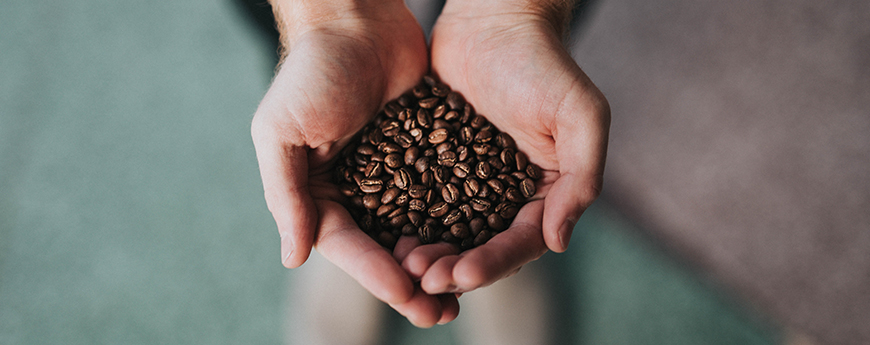
Is decaffeinated coffee healthy?
Decaffeinated coffee is a healthy alternative for anyone who cannot stand caffeine very well. By the way, the nutritional value of decaffeinated coffee is almost the same as a regular coffee. Decaffeinated coffee contains some small amounts of several recommended daily nutrients. For example, potassium, niacin, magnesium and vitamin B3.
Also, decaf coffee often contains the same amount of antioxidants and polyphenols such as chlorogenic acid. These substances reduce oxidative damage. They can also potentially help prevent heart disease, type 2 diabetes and cancer.
So, is decaffeinated coffee healthy? Compared to coffee with caffeine, decaf coffee is indeed slightly healthier. In fact, caffeine brings disadvantages that do not apply to decaf coffee. Whereas in the past you really tasted less coffee, nowadays a decaf bean is top notch and practically unrecognizable in taste. Decaffeinated coffee also offers all sorts of other benefits. That is why it is often considered a healthy alternative.
The best organic decaffeinated coffee is of course bought at Boot Koffie. We have been supplying the best coffee beans, filter coffee and decaffeinated espresso coffee beans since 1973. Would you like to order from us? You can easily do so online through our webshop. Do you have questions or want more information about our products? Then please contact us.
Decaffeinated coffee
Colombia Kachalu Decaffeinated Organic Espresso
Cane sugar, chocolate & dried fruit
-
Horecava - Jan. 13 to 16 - RAI Amsterdam Jan 9, 2025
-
Cold autumn days, warm up with good coffee Nov 13, 2024
-
Vacancy Trainer Workshops Nov 12, 2024
- horecava
- rai
- coffee concepts
- sca national coffee competitions
- cup probes
- barend
- boat
- latte art
- dutch brewers cup
- panama kotowa duncan
- filter coffee recipe
- hario switch
- 2025
- coffee
- state
- hospitality
- entrepreneur
- Specialty Coffee Association
- SCA
- Coffee Concepts
- arabica
- quality
- flavor
- autumn
- intense
- java
- indonesia
- espresso
- warm tastes
- coffee experience
- speculoos show
- coffee autumn
- specialty coffee
- coffee moment
- coffee enjoyment
- artisanal coffee
- coffee inspiration
- boat coffee
- barista trainer
- coffee professional
- give workshops
- coffee tasting
- Boot Koffie
- Amersfoort
- sustainable coffee
- hospitality support
- passion for coffee
- geisha
- gesha
- coffee type
- ethiopia
- panama
- colombia
- willemboot
- famous
- Ethiopian coffee
- panamanian coffee
- gesha origin
- coffee auctions
- hacienda la esmeralda
- quality coffee
- coffee designation
- Colombia La Laguna Geisha Organic - Limited Edition
- live
- roasting
- samples
- tasting
- burn
- cupping
- baarn
- store
- barista
- limited
- amersfoort
- local
- the classroom
- birdsong
- hartmann
- October
- araceli
- coffee of the month
- flat white
- brazil
- brazilian
- fazenda
- sao
- francisco
- bela
- vista
- coffee journey
- rick
- buyer
- drought
- price
- win
- jura
- stanley
- ktc
- happiness
- win
- espresso machine
- winners
- won
- discount
- organic
- filter
- pezzetti
- espresso jug
- filter coffee
- aeropress
- processing
- processing methods
- unwashed
- natural
- sustainable
- washed taste tones
- semi-washed
- washed
- honey
- processed
- blog
- kachalu
- decaf
- decaffeinated
- coffee farmer
- recepet
- instructions
- alejandro
- stable press
- team
- trainer
- business
- edition
- mesh
- premium
- caturra
- maragogype
- sumatra
- kopepi ketiara medan
- fair trade coffee sumatra
- organic coffee
- ketiara coffee cooperative
- hutan project sumatra
- sustainable coffee production
- esther
- indonesia
- blawan
- jampit
- shopping
- especially
- trial day
- organic
- home barista
- happinessflavor
- barendboot
- owner
- bio
- demonstration
- summer
- 84+
- grinding degree
- iced coffee
- panamaria
- koyner
- bunnik
- field kitchen
- food
- drink
- location
- bakery
- vegetable garden
- harvest table
- eko
- blend
- full body
- guts
- municipality
- ondernemen
- durable
- markroell
- mayor
- eemland
- nmvh
- dutch
- society
- industry
- trade
- Espresso
- Filter
- Panama
- coffee plantation
- acf
- amsterdam
- coffee
- festival
- acf2023
- event
- stock exchange
- gas plant
- westgas
- brazil
- coffee grinder
- ratio
- lead time
- month
- santos
- brasil
- times
- vincent
- van dijk
- representative
- resale
- stores
- ricardo
- boquete
- panamese coffee
- rickmaas
- kotowa
- grow
- dry
- select
- trip
- cooperativa
- caficultores
- santander
- rainforrest
- alliance
- tuyettran
- togo
- cups
- wecup
- waste
- litter-free
- re-use
- throwdown
- latte
- art
- milking
- February
- darja
- sexton
- director
- ethiopia
- odin
- organic
- magazine
- interview
- sommelier
- origin
- personal
- exotic
- taste profiles
- experience
- story
- Flavors
- trendy
- trends
- coffee trends
- green
- begin
- 2024
- coffee-of-the-month
- pacamara
- yeast
- yeast
- fermentation
- donjuan
- juan
- fermentation method
- agronomic
- family
- plantation
- administration
- webshop
- lungo
- Indonesia
- Sumatra
- Intense
- Women
- 50
- year
- reunion
- reunion
- the golden coffee box
- employees
- sinterklaas
- December
- piet
- poem
- ode
- spicy
- highly recommended
- nose
- burners
- roastery
- cupping
- perfection
- specialty
- finquita
- shiva
- not
- coffee roaster
- burner
- professional
- manager
- warehouse
- roast
- pro
- skal
- darkroast
- mystery
- smoky
- arnout
- decaffeinated
- quick
- quickmill
- machine day
- machine
- 820
- put
- employee
- store manager
- joukevink
- jouke
- finch
- lovebebber
- passion
- craft
- 50 years
- anniversary
- party
- coffee shop
- action
- quick mill
- hello
- dennis
- from
- will
- events
- account manager
- sales
- sales division
- office
- true
- brazil
- exciting
- travel
- lennard
- woerig
- elwaydesigns
- webdesign
- marketing
- designer
- enthusiast
- boat coffee game
- winner
- specialtycoffee
- Ethiopia
- AeroPress
- Hand Mill
- Outdoor Living
- Filter Coffee
- koffievdmonth
- coffees
- change
- coffee price
- increase
- Fair
- CO2
- costs
- radio
- m
- utrecht
- momoto
- wine
- whiskey
- litchi
- show
- dekoffeeshow
- music
- stories
- experienced
- vocals
- tell
- corazon
- dirkjan
- article
- gooieemlander
- present
- past
- future
- duration case
- goldencoffeebox
- avenue street
- baarnschecourant
- misset
- restaurant
- catering kitchen
- serve coffee
- cooking and cooking techniques
- boat coffee
- capriole
- chocolate
- coffee roasting
- move
- coffee production
- Brazil
- Mantiqueira de Minas
- quantity
- Brazil Santos
- Boat
- top
- two
- coffee dinner
- theLocal
- café
- denhaag
- capsules
- cups
- nespresso
- cup
- nice
- enjoy
- coffee brewing
- ultra
- heirlloom
- panama birdsong
- coffee bushes
- rainforest
- finca hartmann
- best of panama
- misset catering price
- recipe
- cereal drink
- coffee capsules
- coffee substitute
- deforestation
- climate neutral
- caffeine
- decaf
- natural
- certified
- tamp
- baristas
- profession
- box
- master
- moccamaster
- coffee game
- announcement
- filter machine
- tableware
- filters
- cafe
- dirk-jan
- leather
- bestofpanama
- ratibor
- tessie
- winner
- price
- award
- taste
- CSR
- futureproof
- collective
- rainforest
- discount
- action
- actions
- actions
- bonus
- affordable
- prices
- sunshine
- tastiest
- most beautiful
- mexico
- AMS
- climate
- neutral
- press release
- emissions
- carbon
- footprint
- environmental impact
- climate impact
- CO2
- acf2022
- cabra
- yemen
- gourmet
- corona
- conditions
- web store
- order
- Buy
- covid19
- Opened
- changes
- coffee farmers
- price increase
- fairtrade
- amsterdome
- theather
- dragan
- bakema
- draganbakema
- nk blind tests
- soesterberg
- fanciers
- sommeliers
- Kontakt der Kontinenten
- fred nijhuis
- cooperative
- discovered
- kaldi
- legends
- fruits
- monks
- mocha
- qahwa
- coffee shops
- July
- harvest
- new
- organic
- soccer
- uk
- elf
- cold drip
- ride
- bicycle tour
- bunschoten
- scuderia
- lamarzocco
- marzocco
- coffee bean
- life
- sustainability
- coffee grounds
- scrub
- compost
- hands
- her
- skin
- odors
- recycle
- entrepreneurs
- actor
- coffee happiness
- sponsor
- sponsorship
- convenience
- tips
- brewing tips
- milk
- foaming
- Froth
- latte-art
- home
- video
- beginner
- hearts
- flowers
- advanced
- cafetiere
- push pot
- frenchpress
- slowcoffee
- grinding
- brewing instructions
- save
- coffee storage
- how long
- organic coffee
- store brewed coffee
- panamanian
- single estate
- happiness by taste
- trialand-er
- maria
- ruiz
- michiel
- slaats
- coffee song
- smell the bush
- test different
- piano
- trumpet
- milk frother
- Brazil
- Nicaragua
- Ethiopia
- espresso coffee
- pananama
- Tea types
- cocoa
- ktc35
- coffee for peace
- epsresso
- cold
- brew
- coldbrew
- ice
- beverage
- serving tip
- cocktail
- espressions
- work
- manual-filter-coffee-making
- sachets
- ese
- serving
- pads
- fantastic
- fiter
- make the best coffee
- Workshops
- tastings
- temperature
- amount
- warming up
- Amsterdam Coffee Festival
- Is coffee healthy
- is coffee good for you
- how healthy is coffee
- how many cups of coffee per day
- is decaffeinated coffee healthier
- is filter coffee healthier than espresso
- beans
- coffee countries
- countries
- healthy
- cafetière
- scoops
- healthier
- support
- local
- coffeetogo
- the price ofmycoffee
- book
- fair price
- fair coffee
- mission
- acf2020
- socialimpact
- percolator
- coffee cup
- coffee pod
- piston
- sustainablecoffee
- what's the money in coffee
- sustainablecoffee
- did you know
- whatyouneed to know aboutcoffee
- crowdaboutnow
- crowdfunding
- threatened
- low
- revenue
- wedding
- prizewinner
- missethoreca
- finca
- coffee cocoa
- hotspot
- coffee room
- vegan
- conscious
- delights
- smoothies
- acai
- heleenvanroyen
- heleen
- royen
- coffee diary
- coffee school
- hilversum
- plant
- berries
- coffee plant
- harvest
- launch
- coffee orders
- buy coffee beans
- npo3
- inspection service
- inspection of value
- marin frank
- barend boot
- July 11
- TV
- broadcast
- visit
- prideofthailand
- thailand
- thai
- coffee prices
- costa rica
- guatemala
- el Salvador
- honduras
- nicaragua
- fair trade
- middle america
- south america
- conversation
- nk
- blind tests
- fd



